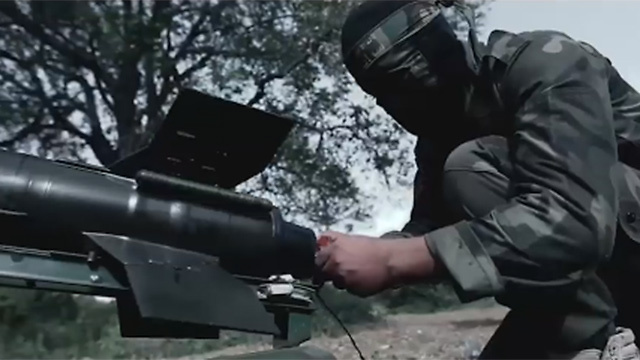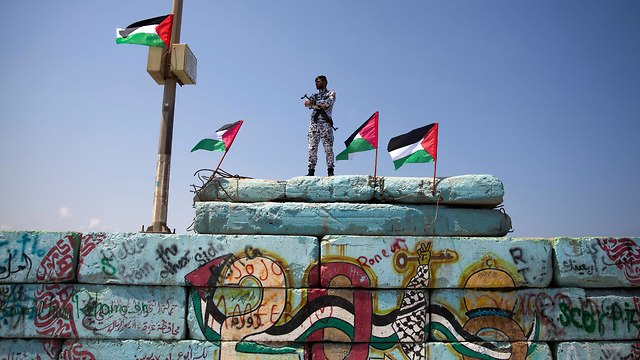Analysis: Islamic Jihad wanted to avenge the death of its operatives and satisfy its bosses in Tehran, Hamas wanted to restore its dignity after Israel attacked its assets and claim part of the fame, but neither the Palestinian organizations nor Israel are interested in a wide-scale operation in Gaza.
The joint statement issued by Hamas and Islamic Jihad on Tuesday evening, in which both organizations took responsibility for the heavy barrages fired at Gaza vicinity communities during the day, changed the situation.
Throughout the day, the estimate in the Gaza Strip and in the IDF spokesperson’s statements was that Islamic Jihad was responsible for the mortar fire to avenge the killing of three of its military operatives in an IDF strike on Sunday. So why did Hamas join the circle?

Well, we don’t know for sure whether Hamas actually fired rockets and mortar shells on Tuesday and Wednesday morning. Giving Islamic Jihad the green light to fire the mortars and rockets was enough for Hamas to take some of the credit for the day of battle.
Sources in the Gaza Strip told Ynet that Islamic Jihad’s decision to fire a barrage at Israel was made shortly after Sunday’s incident, and that they were only waiting for the right moment. Those same sources said that Hamas had tried to soften the response, so as not to drag Gaza into a destructive round of fighting.
Islamic Jihad, however, isn’t just another rebel organization in the Gaza Strip. Islamic Jihad is the second largest organization in the Gaza Strip, with a large and advanced arsenal and a major military force. If it wants to, it responds, and no one can stop it from firing. Not even Hamas.
But after the first barrage, which was fired early in the morning, Israel attacked quite a few Hamas assets in retaliation. The flagship strike was on Hamas’ dual tunnel at the tripoint between Israel, Egypt and Gaza. A 2-kilometer tunnel passing through Egypt and extending almost 1 kilometer into Israeli territory is a strategic asset for Hamas, an asset which the organization put a lot of time and resources into.

From this point, Hamas faced two challenges: One, it suffered a heavy blow which forced it to respond, if only to restore its dignity; two, Hamas never liked the idea of a rival organization taking the lead in the armed struggle against Israel. These reasons forced Hamas to jump on the bandwagon and claim its part of the fame.
The recent reports about talks for a possible “hudna” (ceasefire) in the Gaza Strip could actually increase Hamas’ motivation to create a limited day of battle in Gaza to remind all sides what could happen if the talks and the organization’s demands fail.
Islamic Jihad, on the other hand, always has an interest to create noise. The organization, which enjoys full financial backing from Iran, has to occasionally prove to its bosses in Tehran that it’s worth the money being poured on it.
The combination between the killing of three of its operatives and the general atmosphere of escalation on the southern border served as an excellent opportunity for the organization to fire at Israel. While the events on the northern front are currently unrelated to the situation in Gaza, Iran likely has an interest in signaling to Israel that it is indirectly present in the Gaza Strip too.

Egypt, for its part, needs Hamas on its side in its long war on the Islamic State (ISIS) terror group in northern Sinai. Cairo, therefore, has an interest in maintaining the calm in the strip, which provides it with a quiet border as well. Egypt is also playing an active part in the attempts to obtain an ease of economic restrictions on the strip and has also made a contribution by opening the Rafah Crossing throughout the month of Ramadan to prevent a humanitarian collapse in the strip. Egypt has the ability to impose its will both on Hamas and on Islamic Jihad, despite its affiliation with Iran.
Israel has no interest in a wide-scale operation in the strip either. Apart from the fact that such an operation entails huge financial damage to the Israeli economy (evacuating the Gaza vicinity communities, compensation for damages, calling up reserve forces, increasing the defense budget and an economic slowdown), government ministers—led by Defense Minister Avigdor Lieberman—have reiterated that the Hamas rule in the strip will be toppled in the next wide-scale battle.
Such an ambitious objective would require considerable military resources and a very long stay in the Gaza Strip, which would lead to many casualties. Israel likely isn’t interested in entering this mess while most of its military energy should be focused on the northern front, which is more critical these days.
Connecting all these dots into one map of interests proves that each side is willing to enter a very limited and time-bound conflict but doesn’t want it to deteriorate to a wide-scale military round. But desires are one thing and reality is another thing. Sometimes, a 10-meter deviation in a mortar shell hit is enough to change the entire pictures, without taking either side’s aspirations into account.
As reported by Ynetnews
